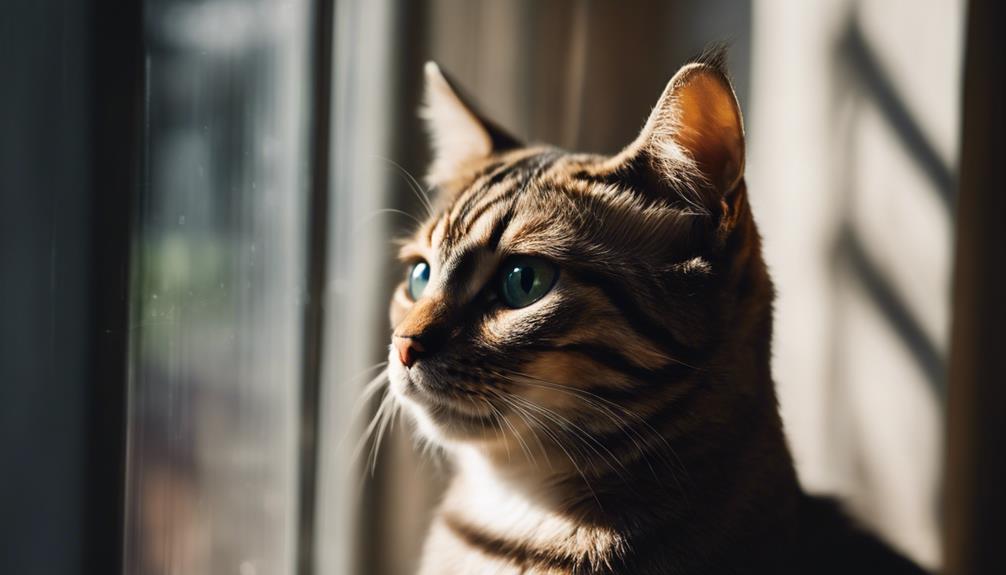As researchers delve into the intricate world of feline behavior, an intriguing revelation has come to light – the potential presence of psychopathic traits in some cats. This discovery challenges conventional beliefs about our furry companions and raises questions about the complex nature of their personalities.
By exploring the implications of these findings, we may gain a deeper understanding of the enigmatic behavior exhibited by cats and its impact on our relationship with them.
Join us in unraveling the mysteries behind these seemingly aloof creatures and uncovering the truth about their potential psychopathic tendencies.
Key Takeaways
- Cats exhibit psychopathic traits like manipulation and aggression, but not as extreme as in humans.
- Understanding genetics, socialization, and personality influences feline behavior.
- Psychopathic behaviors in cats can impact owners but also provide emotional support.
- Recognizing these traits aids in fostering a harmonious relationship with cats.
Research on Cats' Psychopathic Traits
Have scientists discovered any evidence that suggests cats may exhibit psychopathic traits? Research in this area has indeed provided intriguing insights. Studies suggest that some cats may display behaviors reminiscent of psychopathy, such as manipulation, aggression, and a lack of empathy.
While the concept of cats being psychopaths may sound alarming, it is essential to understand that these traits are not as extreme as those seen in humans. Factors such as genetics, early socialization, and individual personality play a role in shaping a cat's behavior.
Impact of Cats' Behavior on Owners
Research on cats' psychopathic traits has shed light on the potential impact of cats' behavior on their owners, revealing intriguing insights into the feline-human relationship. Cats exhibiting psychopathic traits may display manipulative behaviors, such as seeking attention only when it suits them or playing with their prey before hunting it. These traits can affect the owner's emotional well-being, causing frustration or feelings of being controlled.
On the other hand, cats' ability to sense human emotions and provide comfort can have a positive impact on their owners, promoting relaxation and reducing stress levels. Understanding these aspects of cats' behavior can help owners navigate their relationships with their feline companions more effectively and cultivate a harmonious living environment.
Cat Ownership and Human Health

Cat ownership has been linked to various health benefits for humans. Studies have shown that having a cat as a pet can positively impact the well-being of their owners. Here is a breakdown of some of the health benefits associated with cat ownership:
| Health Benefit | Description | Example |
|---|---|---|
| Stress Reduction | Petting a cat can help lower stress levels | Spending time with a cat |
| Lower Blood Pressure | Cat owners tend to have lower blood pressure | Regular interactions |
| Decreased Risk of Stroke | Cat ownership has been linked to a reduced risk of stroke | Living with a cat |
| Improved Mental Health | Cats can provide companionship and reduce feelings of loneliness | Caring for a cat |
| Allergy Prevention | Exposure to cats in early childhood may reduce the risk of allergies | Growing up with a cat |
Differentiating Cat and Dog Behavior
In understanding the distinctions between feline and canine behavior, it becomes evident that each species exhibits unique traits and responses to various stimuli. Cats and dogs have different ways of interacting with their environment and their human companions.
Here are three key differentiators in their behavior:
- Communication Styles: Cats tend to be more independent and communicate through subtle body language, whereas dogs are often more social and vocal in their interactions.
- Response to Training: Dogs are generally more trainable and responsive to commands, while cats may be less inclined to follow instructions and prefer to act on their own terms.
- Social Hierarchies: Cats are more solitary animals and establish territorial boundaries, whereas dogs are pack animals that thrive in social structures with clear hierarchies.
Responsible Ownership for Cats

A fundamental aspect of ensuring the well-being of feline companions involves practicing responsible ownership that encompasses proper care, attention, and understanding of their unique needs. Responsible ownership for cats includes providing a balanced diet, regular veterinary check-ups, and a safe environment that meets their physical and psychological requirements.
Cats thrive on mental stimulation, so engaging them with interactive toys and playtime is essential for their well-being. Additionally, maintaining a clean and comfortable living space, including a designated area for scratching and climbing, promotes a healthy environment for cats. Regular grooming, such as brushing their coat and trimming their nails, is crucial for their physical health and helps in preventing behavioral issues.
Conclusion
In conclusion, the revelation of psychopathic traits in some cats sheds light on the intricate and enigmatic nature of these feline companions.
Like shadows in the night, their behaviors hint at depths beyond our understanding, challenging our perceptions of their personalities.
As we navigate this mysterious realm, let us embrace the complexities of our feline friends with curiosity and understanding, for within their enigmatic minds lies a world waiting to be explored.




